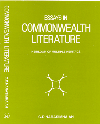|
|
| |
Essays in Commonwealth Literature: Heirloom of Multiple Heritage
|
|
By
C.D. Narasimhiah |
|
 |
| |
What was once dismissed as ‘the lingo of lesser breeds,’ has over the years yielded Commonwealth literature of compelling power and artistry. The essays in this volume evaluate the various constituents of this literature, notably Indian, African, Australian, West Indian and Canadian, and posit how these constituents have come to acquire the ‘right of vision,’ and register ‘the appreciation of difference’ with one another.
In equal measure, this study examines the responses made by the major commonwealth writers to the challenge of projecting their multilingual and multicultural experiences through the medium of English , and the extent to which their works have succeeded in evoking the indigenous flavour of their lives and lands in concert with their own idiom, rhythm, and symbols. In Commonwealth writng, then, William Cowper’s rose is, as it were, crossed with his lily to produce Toru Dutt’s lotus, ‘the queenliest flower’. The Ibo Achebe has given the lie to claims of the white man’s civilizing mission and Patrick White, influenced by the home-spun vision of M.K. Gandhi, has written novels of suffering and spiritual fibre.
While the essays unreservedly give credit where it is due, they are candidly critical of what their author calls the inflated reputations of V.S. Naipaul and Nirad Chaudhuri and the spurious reputations of Salman Rushdie and Vikram Seth.
|
|
C.D. Narasimhaiah, educated at the Universities of Mysore and Cambridge, was Professor of English at the University of Mysore from 1950 to 1979. Rockefeller Fellow at Princeton (1949-50) and Fulbright Visiting Lecturer at Yale (1958-59), he was visiting Professor at several universities, including Leeds (U.K.), Texas (U.S.A.), Queensland and Flinders (Australia). He is currently Director, The Literary Criterion Centre for English Studies and Indigenous Arts, Dhvanyaloka, Mysore.
Pioneer of American Literature studies in India in the fifties and sixties and of Commonwealth Literature studies in the seventies, Professor Narasimhaiah has authored numerous research articles and edited over a dozen books published, among others, by Macmillan and Oxford University Press. His major book-length studies include The Swan and the Eagle, Jawaharlal Nehru, Raja Rao, Writer’s Gandhi, Moving Frontiers of English Studies in India, and Indian Critical Scene: Controversial Essays.
Professor Narasimhaian was elected (Global) chairman, Association for Commonwealth Literature (1974-77), and President, All India English Teachers’ Conference (1989). Awarded Padma Bhushan by the Government of India in the year 1990, he ranks among the most sensitive, bold, and distinguished scholar-critics of India.
|
| |
|
ISBN 81-85753-06-7 2005 264 pp Rs.400 (hb) |
| |
|
Narasimhaiah’s book is certainly a welcome arrival particularly as a volume of essays which will not only help all young scholars understand the phenomenon called commonwealth writing in the right perspective but also stimulate critical thinking of the best kind.
|
| The Hindu |
|
| |
|
|
|
| |
|
|
